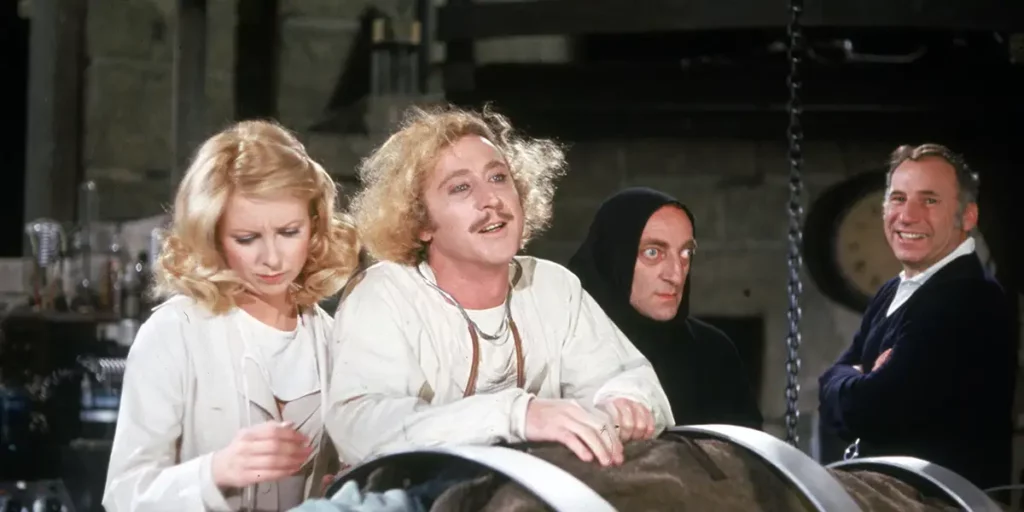Ron Frank’s documentary Remembering Gene Wilder looks at a comedic legend in American movie history through interviews with him and those he worked with.
Remembering Gene Wilder is about the charisma and gravitational force of renowned actor Gene Wilder. It’s an exploration of him and his filmography, with background from his life weaved in seamlessly and grounded by his films – with key moments of life anchored to parts of his filmography. This is a rosy look on the actor, and no negative word is said. But the title should give you this sense. This is Gene Wilder in memoriam.
One of the most striking things about this documentary is that so much of it is told in Wilder’s own rich voice. The actor is no longer with us but did a lifetime’s worth of interviews, which the documentarians Ron Frank and Co. piece together in service of their narrative. This is a contemplative look at a contemplative artist. Yes, there are also other interviews, following in good documentary form. Talking head fans won’t be let down. However, the lens of this story is told from Gene’s perspective.
Remembering Gene Wilder has a certain fondness and warmness washing over all of the films and the subjects covered – things are looked at with a particular joy. It’s the equivalent of Vaseline over the camera lens, with things getting fuzzier with recollection. When things in Gene Wilder’s life shift, the documentary gets sad. The final chapter of Wilder’s life still had smiles, but it was also marked by an unfortunate decline due to Alzheimer’s. The moments in this season of Wilder’s life are heartbreaking and will ring true, especially if you’ve had a family member or loved one in the same situation. Some clips are uncomfortable, and you see the decline of a once vibrant person slipping away.
Although the man himself is a legend, Remember Gene Wilder points out that Jerry Silberman (aka Gene Wilder before he took his stage name) is in there, knocking around. The documentary is not a look at the actor’s personal life alone – this is not some expose. It is very much an exploration of his life through his acting life and Gene Wilder, the professional. We meet his mom and dad in the context of what they influenced on film. We meet his wife, Gilda Radner, in the context of their meeting for a movie and how that progressed from there. It’s almost a chicken and egg situation – when you’re in the public eye, and your job is your life, so much of your life is your job.

What we see of his young life – his mother, the home in Milwaukee – is framed by what it meant for his future career. There’s a moment about his mom that is the essence of Gene – his mother had a heart attack when he was 8. A cardiologist came to his house to check on his mom (not fiction, although these days it might make you do a double take) and took him aside to give him a stern warning – don’t ever argue with your mom, only make her laugh. This was a terrible burden for a child to bear, but the world is brighter because of Gene’s genuine humor. Of the people reflecting on Gene Wilder’s life, perhaps the most impactful is Mel Brooks. At the time of filming, Brooks was 97 and quite old. Brooks cherished Wilder, and that comes through in his interviews.
Brooks isn’t the only special relationship that Gene Wilder had with an icon. Remembering Gene Wilder does a deep dive into Wilder’s friendship with Richard Pryor. The two had a chemistry and emotional connection that made them a great pair on screen. As Pryor’s daughter points out, Pryor knew there was magic between them. Their magic came alive at first on Silver Streak.
There’s another reason to look at the documentary if Gene Wilder wasn’t enough for you. There are some incredibly insightful interviews with titans of cinema history: Alan Alda, Mel Brooks, and Carol Cane (shout out to Star Trek: Strange New Worlds). They’re talking about Gene and, at the same time, giving mini-history lessons on classic films. The Producers (or Springtime for Hitler) isn’t the Producers without Wilder for Leo Bloom. Young Frankenstein almost went to Columbia Pictures and would have been in color if Brooks and Wilder hadn’t been steadfast in it for being in black and white as a tribute to the 1934 version. You’ll pick up a ton of knowledge as you learn about history through Wilder’s life.
There is a moment in the documentary where one of the interview subjects praises the “care and specificity” in which Gene Wilder approached his role as Willy Wonka. Just like Wilder deserved the praise for that outing, so too do the filmmakers behind this inside look into the man deserve praise for the care and specificity they put into its assembly. Remembering Gene Wilder is more than a generic retrospective; it is a thoroughly researched and well-made documentary about a man to whom millions worldwide owe smiles. Forget the bio-pic (sorry, Jeremy Allen White). This is a worthwhile look for anyone who enjoys film.
Remembering Gene Wilder will be released in US theaters on March 15, 2024.

